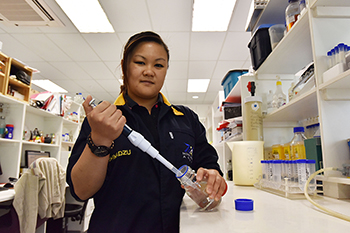Latest News Archive
Please select Category, Year, and then Month to display items
06 August 2021
|
Story Nonsindiso Qwabe
![]()

Every year, the Active Civic Teaching Office (ACT) at the University of the Free State runs the Big Give campaign to raise food, money to buy food, and other forms of assistance for needy students. This year is no different. ACT’s big project is raising money for sanitary pads for students on all three campuses. The project will run throughout Women’s Month, August 2021. Providing menstrual hygiene products to female students empower them to continue their studies in comfort.
Karen Scheepers, Assistant Director: Kovsie Support Services, said: “This year, one of the challenges that have been highlighted is the lack of sanitary wear for students. Therefore, we focus our Big Give campaign this year on addressing this challenge that students are experiencing.”
Be part of the Big Give campaign by donating sanitary pads or money towards this initiative. Donation boxes are ready for donations at all the entrance gates of all three campuses. Your donation will go a long way in helping a deserving student.
The impact of personal care products on water resources in the Free State
2015-12-14

Jou-an Chen
Photo: Charl Devenish
|
Water is of the utmost importance in personal hygiene. Most people can hardly have a day go by without taking a shower in the morning and at night. However, it is this very habit that is increasingly polluting the water resources in South Africa.
Contaminants found in pharmaceutical and personal care products have been accumulating in water masses in recent years. These contaminants especially refer to hormones in medication, as well as colouring agents and fragrances used in soap, shampoo and body lotions.
“Little information and data are available on the prevalence of these contaminants, and on how high the level of pollution really is,” says Jou-an Chen, researcher in the Department of Microbial, Biochemical and Food Biotechnology at the UFS.
Her research particularly focuses on the prevalence and impact of those contaminants.
“Because these substances have not been properly investigated, we are not sure how widely it occurs and whether it is harmful to the environment. It was precisely the lack of information that has inspired me to investigate further.”
“If we could identify the contaminants and what it is doing to the environment, it could make a valuable contribution to directives on water quality standards.”